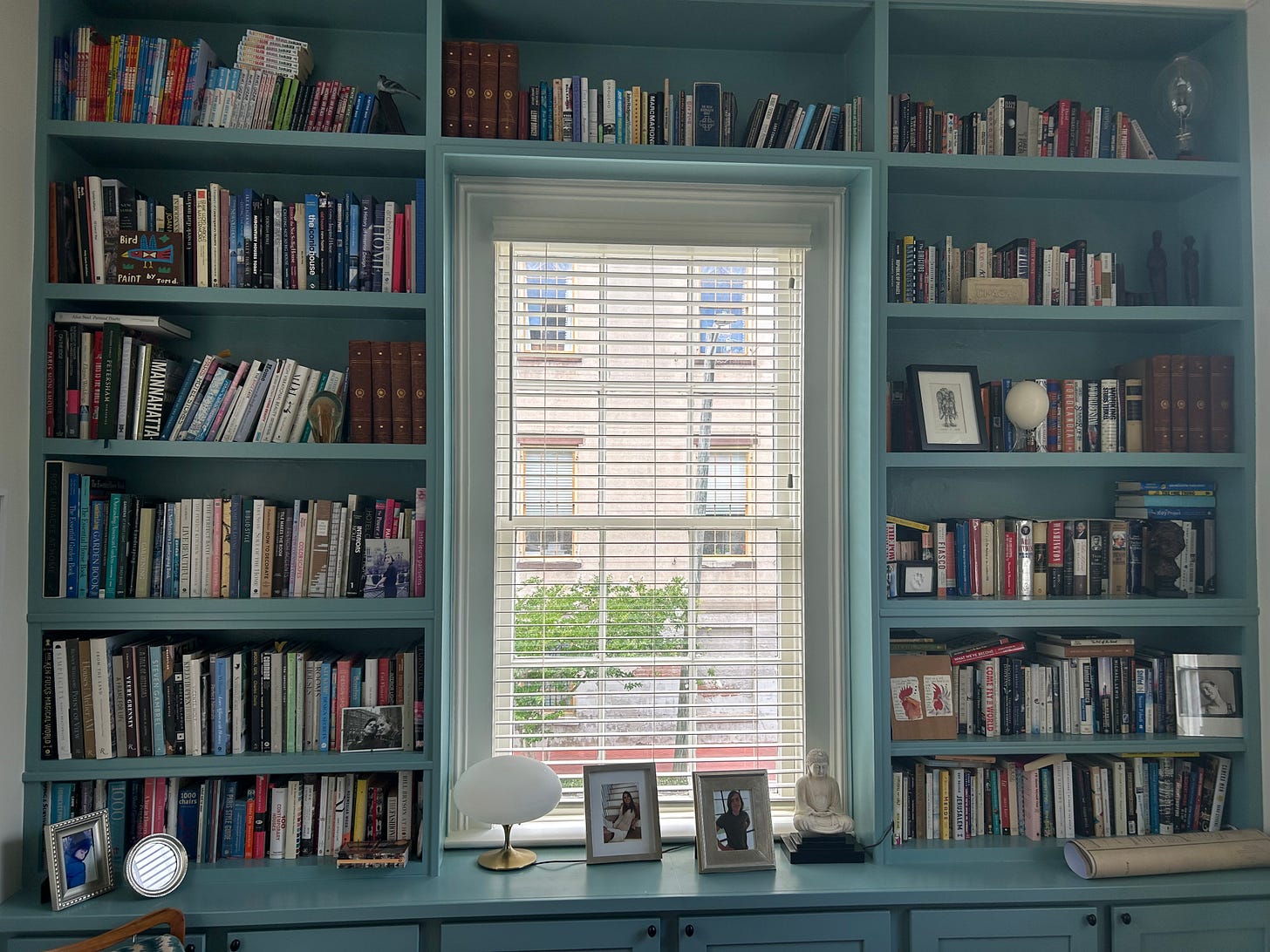I read somewhere that book collections are aspirational. The books you buy are books you would like to read, and while you will certainly read some, chances are you will never read all. I have books on my shelves that have remained unopened for decades. Moo by Jane Smiley, purchased used because I liked the title. Jhumpa Lahiri’s The Lowland, which I cannot remember buying or why I bought it other than it had the kind of literary pedigree that so often entices me to buy a book, but often isn’t enough to get me to actually read it. Solzhenitsen’s 1914 is another. I’ve probably owned it for twenty years, but the thought of cracking open a four hundred page book about the misery of pre-revolution Russian life during the first year of the The Great War seems like a colossal bummer.
I also have a rule that I am not allowed to enter an independent bookstore without purchasing something. This rule ensures that my book collection will continue to grow despite the fact that I have neither room nor money for extraneous literary purchases because I cannot resist an independent bookstore, particularly if the store features a sleeping cat in the window. Cats are a bookseller’s best friend.
The problem with accumulating so many books is they become difficult to store. In our current Savannah manse, we have several large bookcases. I spent days neatly alphabetizing the titles when we first arrived, culling the fiction from non, organizing the non-fiction into reasonably searchable categories such as “politics,” “memoir,” and “radical feminist poetry.” (I’ll be honest - I don’t have a radical feminist poetry section, but I do have a couple books by Eileen Myles just they’re the coolest.) The fiction is organized strictly by author’s last name. Sometimes, as with the case of The Sympathizer’s Viet Than Ngyuen, I’m never sure whether to place it under “T” for Than or “N” for “Ngyuen” or “V” for Viet, as I am told that Asian names begin the surname. Very confusing. At the moment, I’ve got it in the “N’s,” but I’m not sure this is correct. Also, I haven’t read it.

In fact, owning books I have no intention of reading formed the basis for my podcast, Obscure, in which I read works of classic literature out loud and comment on them as I go. The only rules for the books I read are that: 1. I cannot have read them before, 2. I have no desire to read them. So far, we’ve covered Thomas Hardy’s Jude the Obscure, Mary Shelly’s Frankenstein, Emily Bronte’s Wuthering Heights, and we are currently reading Thomas Dreiser’s An American Tragedy.
It's kind of startling sometimes to take a step back and realize that reading classics is a lot like entering a time machine. The words they use, the manner of their speech, their behavior. Reading a book is telepathy. It’s exactly reading somebody else’s mind, which is a startling idea to consider. We don’t think of the book as a supernatural object but that’s precisely what it is, a document of a person’s thoughts frozen in time. Kind of cool, eh? I have read many time traveling books.
Sometimes I think about what I would do if civilization collapsed. What would be my first stop when trying to save my family? The grocery store? The gun shop? I think I would go to the library. Everything we would need to begin anew can be found there. Books about agriculture and construction and stories about resilience. I could grab as many helpful books as I gather in my arms, and then wait to get eaten, probably because I couldn’t defend myself with an armload of books. Let’s face it, no matter what precautionary steps I take, I’m not the kind of guy who survives a civilizational collapse. But at least I’ll die with a good book.
Some books I’m currently reading:
• To Paradise by Hanya Yanagihara
• Mindfulness in Plain English by Bhante Bhante Gunaratana
• Tales from the Ant World by Edward O. Wilson
There’s about fifteen more stacked on the bottom shelf of my night table, which I pick up and put down and then forget about until such a time arises that I remember they are there. The Loneliness of the Long Distance Runner by Allan Sillitoe has indeed been lonely, as it’s been sitting on the bottom rung of my night table for about a year and a half. Poor thing.
There are, of course, book snobs, those poor saps who deprive themselves of the joy of trashy books. The category of “trashy books” is the one in which I spend most of my time. My tastes are middlebrow at best. I have read every goddamned stupid spy thriller that has found its way into my hands. I have read hundreds of ludicrous assassin novels and doomsday books, with my favorite being War Day by James Kunetka and Whitley Strieber. I’ve read lots of boring sports books, including several by John Feinstein, who is an admirable reporter but kind of a dull storyteller. My favorite sports book, by far, is Roger Kahn’s The Boys of Summer, which tells the story of the 1955 world champion Brooklyn Dodgers, fifteen years past their glory days.
In our old house, we used to have a library ladder, rattling black metal thing that ran along rails set ten feet up. The ladder infused our collection with solidity and, dare I say, gravitas. The ladder is gone now, as well as dozens of books we donated when we moved, only to replaced with dozens more. Some of them will get read and some will not. But that’s not really the point when it comes to collecting books. We live with them as if they are silent staff, waiting to assist us when called upon. Treat your books well, not as precious objects, but as good friends. They will always be there for you when needed They’re our truest and best helpers in this life.





So who else enlarged the photos to read all the book titles? Everyone?
"Reading a book is telepathy. It’s exactly reading somebody else’s mind, which is a startling idea to consider. We don’t think of the book as a supernatural object but that’s precisely what it is, a document of a person’s thoughts frozen in time."
oh yes indeed! Reminds me of this quote from Alan Bennett:
“The best moments in reading are when you come across something – a thought, a feeling, a way of looking at things – which you had thought special and particular to you. Now here it is, set down by someone else, a person you have never met, someone even who is long dead. And it is as if a hand has come out and taken yours.”